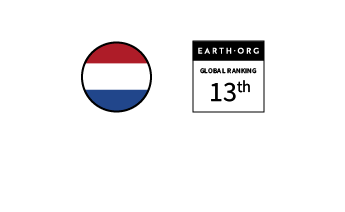Welcome to the Earth.Org Global Sustainability Index, where Earth.Org examines the policies and actions regarding the environment of every nation on earth. Combining the most respected global indexes on pollution, climate change, policy, energy, oceans, biodiversity we have produced an overall Global Index, which will be updated annually. This is the Global Sustainability Index scorecard for Poland.
Since it moved to a market economy in 1989, Poland’s economy has doubled in size and emissions have gone down by a third, largely driven by the closure of inefficient and energy-intensive plants. However, coal provides 80% of the country’s electricity, contributing to poor air quality; 33 of the 50 European cities with the worst air quality are in Poland. However, it has indicated that coal use will decline more rapidly by 2040, shifting to nuclear power, renewable energy and high-efficiency cogeneration.
The EU committed to become carbon neutral by 2050, however Poland is exempt from this, saying that it ‘can’t commit to implement this objective’ and will pursue it ‘at its own pace’. Poland will become the bloc’s second largest source of carbon after Germany when the UK leaves the EU.
Despite having no real plan to abandon coal or commit to the carbon neutrality goal, Poland is allowed to access EU money designed to reach the goal without having to change its climate stance. The prime minister promised that Poland is building its plan to achieve carbon neutrality, but soon after announced plans to create a $33 million reserve of hard coal, propping up demand for coal mining.

- The EU has set a carbon-neutral goal for the continent by 2050, but Poland was granted an exception. The country claimed to be unable to ‘commit to implement this objective’.
- Around 80% of Poland’s electricity comes from hard coal or even more harmful lignite. This high dependency is the main reason Poland has been given a pass by the EU to reach carbon neutrality at its own pace. The current goal is to cut coal-generated electricity to 60% by 2030.
- The climate crisis is not a prevalent conversation topic in Polish media. The academic Zbigniew Kundzewicz explains that many believe mitigation could damage the country.
You might also like: Global Emissions (2016)
References:
-
Biodiversity, Policy: Sachs, J., Schmidt-Traub, G., Kroll, C., Lafortune, G., Fuller, G. (2019): Sustainable Development Report 2019. New York: Bertelsmann Stiftung and Sustainable Development Solutions Network (SDSN).
-
Oceans: Halpern, Benjamin S., et al. “An index to assess the health and benefits of the global ocean.” Nature 488.7413 (2012): 615-620.
-
Pollution: Wendling, Z. A., Emerson, J. W., Esty, D. C., Levy, M. A., de Sherbinin, A., et al. (2018). 2018 Environmental Performance Index. New Haven, CT: Yale Center for Environmental Law & Policy. https://epi.yale.edu/
-
Climate Change: Climate Change Performance Index; Jan Burck, Ursula Hagen, Niklas Höhne, Leonardo Nascimento, Christoph Bals, ISBN 978-3-943704-75-4, 2019
-
Energy: Enerdata –World Energy Statistics – Yearbook.
World Energy Statistics











